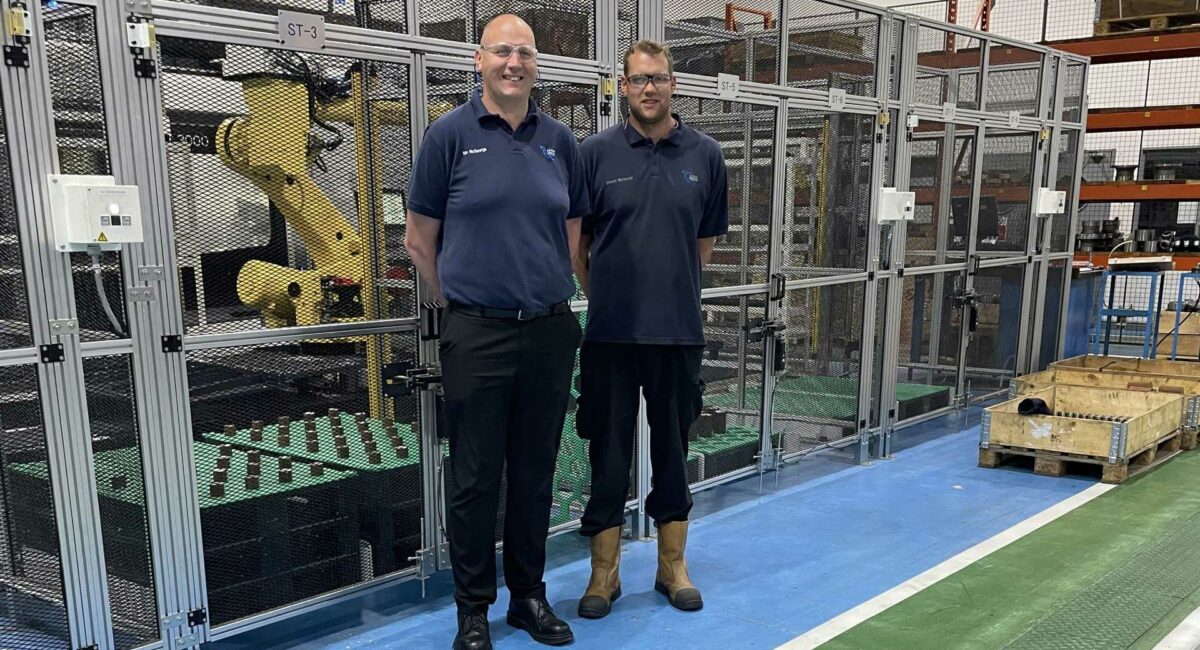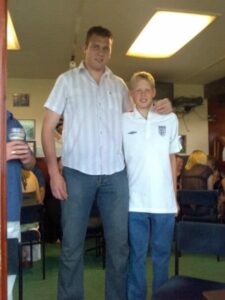At the British Engines Group, we are proud of our reputation as a family-run and family-oriented business. With many of our sites based across the North-East, we employ several generations of families from across the region.
Throughout the year we will be recognising the huge part that generations of local people have played in helping British Engines reach 100 years. As a North East employer we are extremely proud to have a number of families working in various roles across the group.
This week we spoke to cousins Ian and Steven McGeorge who both work at group company, Rotary Power. Ian and Steven started their careers at the British Engines Group as apprentices before working their way up to becoming Manufacturing Manager and Drives Support Engineer.
Can you start by telling us how you are both related?
Steven: Ian is my older cousin. It’s actually a bit of an unusual situation because our mums are sisters and our dads are brothers, so two sisters married two brothers!
What are your current roles at Rotary Power?
Ian: I am the Manufacturing Manager, so I oversee manufacturing in the UK and also offer support to our factory in India, which I regularly visit.
Steven: I currently work in the Drives Systems department building and designing hydraulic power units. We also support work in the development shop which includes working off-site at customer facilities installing hydraulic motors and servicing power units.
Can you tell us about your journeys through the business and how long you’ve worked at Rotary Power?
Ian: As of the 1st September 2022, I will have been at the company for 25 years! I started as an apprentice at Rotary Power in 1997 when British Engines had an on-site training school. I began working on the CNC machines whilst completing my academic training at Newcastle College. In my third year I won the Apprentice of the Year Award and then in my final year I got the HT Lamb Award!
After finishing my apprenticeship I worked as a CNC Machinist until 2003 when I was offered a role in production engineering. During that time I was lead on a project that was linked to a mine rolling pump used by the US military to clear land mines. That assignment showed me that project management was the route I wanted to go down, so 11 years ago I moved into my current role as Manufacturing Manager.
Steven: I’ve been working at Rotary Power for about 12 years. I started as a second year apprentice in 2010 after doing my first year at Derwentside College. For the first two years I worked on the grinding machines. I then briefly worked on the Mazak CNC machines before being offered the chance to work in the office as a Trainee Production Engineer. I actually won the Apprentice of the Year Award as well!
I stayed in my production engineer role until about two years ago when I was asked to join the drives systems department. Working as a Trainee Production Engineer was a great experience but I was based in the office most of the time, whereas my current role is a lot more hands-on. I especially enjoy working off-site because a lot of our projects are based on recycling yards so I get to work on big plant machinery.
Steven, how did you come to work at Rotary Power?
Steven: Ian’s dad, my uncle, was an engineer and we used to work on machinery together when I was younger. I actually did work experience at the company he worked for whilst I was at school, which I really enjoyed. When I finished school, Ian suggested that I apply for an engineering apprenticeship at Rotary Power and the rest is history!
Ian: I showed the apprenticeship advert to Steven to make sure he was aware of the opportunity but he got onto the apprenticeship programme entirely on his own merit. I knew he’d be very suited to the role.
What changes have you seen during your time working at Rotary Power Ian?
Ian: The group has consistently made significant investment and a number of acquisitions since I started as an apprentice. When I first started, British Engines was solely located at the site in Byker. CMP Products then moved to Cramlington, allowing CMP and BEL Valves to expand, then Rotary Power moved to South Shields allowing Rotary Power and BEL Engineering to expand. In more recent years, the group has also acquired Michell Bearings. The group’s growth over the last 25 years has been phenomenal!
What do you like about working at the British Engines Group?
Ian: The company has always had a family feel to it and its maintained that despite its massive growth. There are a lot of family members working across the group and people often suggest to their sons, daughters, siblings, cousins, that they apply for the apprenticeship programme or a vacancy within the group. I think that’s a really important part of the British Engines culture. I could shout from the hilltops what a great company it is to work for. That’s why I’ve stayed for 25 years!
What do you think will happen at the British Engines Group over the next 100 years?
Ian: I think it will continue to expand significantly. Perhaps more companies will join the group so we can expand and diversify even further. As it stands, the group has a very diverse offering which allows us to provide a complete engineering solution, so I’d like to think that could be developed further. I’d love to think in 100 years’ time that it’s still owned by future generations of the family that established it 100 years ago.
Steven: I’d like to see the drives department at Rotary Power grow and develop further to take on larger projects and become the market leader. From a personal perspective, I would like to take on a role that enables me to see our products all the way through from build to implementation, checking to see if we can improve or optimise any aspects along the way.
Did you spend much time together when you were younger?
Ian: I’m going to embarrass Steven now but I used to babysit him when he was a lot younger! Steven and I are quite similar, we both spent a lot of time in Beadnell growing up at our families’ caravans. We were a bit like brothers when we were younger.
Steven: We did see quite a lot of each other back then! Growing up, Ian and his parents lived in the next street over and his dad used to take us everywhere. I think my uncle is the reason I developed such a passion for engineering because he spent so much time showing me and my brother how things worked and how to take them apart and put them back together.
What do you like to do in your spare time?
Steven: I spend most of the summer at vintage car shows, I probably visit about fifteen each year! I really enjoy fixing old machinery in my spare time. My friend has two steam engines that we work on together and I have four vintage tractors and some other old machinery that I try to restore.
Ian: I’m rugby mad! I’ve played for my whole working career but more recently I’ve started coaching alongside managing the fixtures at Consett Rugby Club. I have two boys, Will who is ten and Isaac who is seven, who also love sports. Isaac is like a mini-me, he wants to come to work with me at Rotary Power!
We still visit Beadnell a lot as a family. Steven’s brother has a boat up there so we sometimes go out sea fishing together or take trips to the Farne Islands with the kids. We all really enjoy water sports, particularly paddle boarding.
What do you admire most about each other?
Ian: Steven has such a passion for repairing machinery. I guess that’s one of the reasons why I thought engineering would be a great career choice for him. When he expressed an interest in doing an apprenticeship, I had no doubt that it would be right for him. Watching Steven develop over the years has been amazing, to see his commitment and passion grow to where he is today.
Steven: Ian is such an organised person. He is the guy his friends go to if they wanted to plan a get together. He’s also the one who encouraged me to get into sports like rugby, even though I gave it up as I got older, he’s definitely had quite an influence on me.
What piece of advice would you give to someone starting out as an engineering apprentice?
Ian: I told Steven when he was an apprentice to act like a sponge and absorb everything. You’re working with people who have many years of experience so it’s important to listen to them and learn from them.
Steven: When you’re having a difficult day, or doing a task you might not enjoy as much, just remember that there will be so many other days where you get enjoyment and satisfaction out of what you’ve achieved. Those days where you do really well, or achieve something big like completing a project, make everything worthwhile.
Thank you very much for speaking to us Ian and Steven, we wish you both the best of luck as you continue in your roles at Rotary Power!
Find out more about the history of the British Engines Group and how we’re celebrating our 100 year anniversary.

